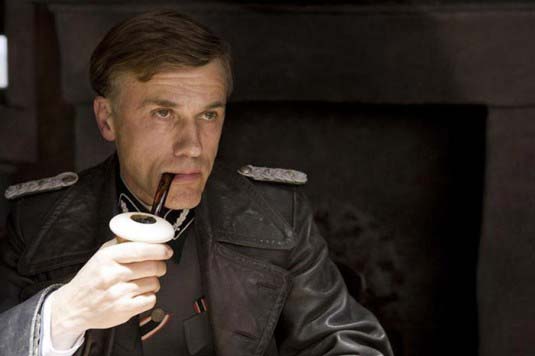Unlike “Pulp Fiction,” Quentin Tarantino’s “Inglourious Basterds” pushes no new boundaries in terms of cinema; so it may just fall in at number two on Tarantino’s best list. But this film is a testament to his lifelong passion with movies.
“Inglourious Basterds” displays directing, acting, writing, cinematography and art direction at its finest, and it is the best movie of 2009.
Tarantino’s episodic tale is not a World War II epic but a story set in 1940’s occupied France. His acute obsession with the intricacies and depth of his characters drives the action, and the result is a verbose yet invigorating endeavor. The film clocks in at two and a half hours, but these dialogue riddled scenes each more intense than the last make the time fly by. And yet, the film only has anywhere between 10 and 15 scenes. Tarantino moves the action along through his conversations, and if violence is a consequence or resolution to the scene, it is because his characters have led it to that point.
So any fanboy attending “Inglourious Basterds” may have to wait for the blood to hit the fan, and they will no doubt be praising the beautifully orchestrated violence Tarantino can conjure, but in their patience they will not be disappointed. Tarantino’s screenplay is the crowning achievement of the film, and it’s well deserving of his Oscar nomination.
The film begins in 1941 France at a farmer’s home. Colonel Hans Landa (Christoph Waltz) is interrogating the farmer on suspicion of harboring a Jewish family. Landa knows the family is hiding under the man’s floorboards and makes quick work of them but has one 18-year-old girl, Shoshana (Mélanie Laurent), escape.
I’ve done a poor justice to this delicately laid out scene that offers so much in terms of suspense and character development. Christoph Waltz’s Landa is brilliant, demonstrating such range and terror in his character’s personality. To describe him in any way would be to lead to a cliché, as he is tough and determined but not brutal. He is toying and wise but not deceptive. Landa’s wisdom, ability and principles outweigh any boundaries of a character sketch, and Waltz’s talent to illicit such range, acting fluent, proficient and fearsome in German, French, English and in one hilarious scene Italian, is unprecedented.
Anyway, back to the story. Cue in the Basterds, a mercenary group of American Jewish soldiers disguised as French civilians. Lt. Aldo Raine (Brad Pitt) leads them in a mission to claim 100 Nazi scalps apiece. And he wants his scalps! Everything that needs to be known about the Aldo Raine character is told in his opening monologue to the Basterds, and conveniently enough, this scene has also served as the trailer. Pitt’s character may be the single one-dimensional character in the film, but Pitt plays him so openly, he leaves nothing to suspicion.
The Basterds are simply a killing force and are actually very inconsequential to the overall plot to blow up a cinema showing a German film premiere in attendance by the four chief Nazi officers, including Hitler himself. Fitting that in a way, the Basterds plan is a failure and surrender followed by a betrayal. But their characters are necessary to add to the concept of principles hanging over the film.
It’s also possible that the inclusion of the Basterd characters at all is to serve as a form of parody to the heroic Americans portrayed in virtually every World War II film to date. In addition to a parody and somewhat of a comedy, “Inglourious Basterds” is an homage to all genres of film Tarantino has admired over the years.
So many of his shots and details are reminiscent of old classics. Notice the aerial view of a character leaving a room, the fishnet mask of a woman in a red dress, the ‘70s blacksploitation style subtitle of a man’s name before his origin story is told, and the spaghetti-Western style music as “The Bear Jew” makes his entrance. All of this and more are the lacing between his film. They are the extra tidbits that give “Inglourious Basterds” not just flair, but style.
I was even wrong to say that “Inglourious Basterds” pushes no boundaries. Firstly, his film’s ending, without giving anything away, changes history. The story is fiction and so are his characters, so to make them bow to an arbitrary concept of historical accuracy would be unnatural, uninspired and unintuitive.
Tarantino’s work is also influential in challenging the mood set for this year that all films possessing violence need contain mindless, if occasionally stylistic, action. Many of his scenes are not driven by action or even story but instead by character motivation and development. No film in 2009 has been able to match the consequence generated by two people simply having a conversation.
The nerve it takes to spit in the face of the Hollywood blockbusters by filming a “talkie” and making it the most invigorating, exciting film of the year is something remarkable and something only Quentin Tarantino could do.
4 stars
